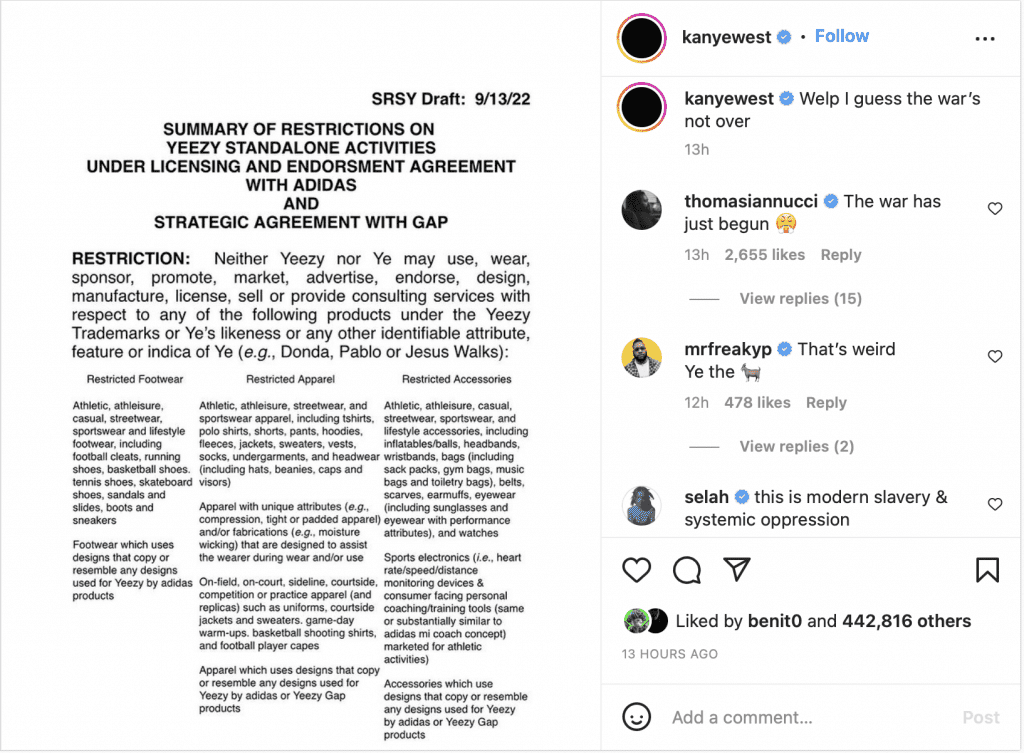Kanye West’s desire to branch out on his own and operate his Yeezy brand separately from existing partners adidas and Gap may not prove to be an entirely seamless transition. On the heels of revealing plans to terminate his Yeezy Gap venture (which was slated to expire in 2030) and counsel for West confirming that the rapper-slash-design-figure will open independently-operated Yeezy retail outposts, Kanye shared one page of a recent draft summarizing some of the terms of the deals he entered into with Gap and adidas in an Instagram post on Sunday, stating, “Welp I guess the war’s not over,” and seemingly suggesting that a legal squabble could be in the works in the event that he engages in certain standalone activity.
The summary of terms – which was compiled by counsel at Stradley Ronon Stevens & Young and is dated September 13 – summarizes various limitations that were ostensibly set out the licensing and endorsement agreement that Kanye West previously signed-off on alongside adidas for his long-running Yeezy deal and his strategic agreement with Gap for the Yeezy Gap collection. The restrictions place limits on the types of goods that West, who legally changed his name to Ye this summer, and his company Yeezy can endorse, advertise, manufacture, etc. in order to prevent him and/or his brand from competing with adidas and/or Gap and the products/services that they are offering up under his and/or the Yeezy name.
Specifically, the excerpt states that Ye and Yeezy are limited in terms of what they can “use, wear, sponsor, promote, market, advertise, endorse, design, manufacture, license, sell or provide consulting services with respect to … products under the Yeezy trademarks or Ye’s likeness or any other identifiable attribute, feature or indica of Ye (e.g., Donda, Pablo or Jesus Walks).” The products primarily include “Athletic, athleisure, streetwear, sportswear, and lifestyle” apparel, footwear, and accessories. Ye and Yeezy are also prohibited from making, marketing, selling, etc. apparel, footwear, and accessories that “use designs that copy or resemble any designs used for Yeezy by adidas or Yeezy Gap products.”

The applicability of such restrictions from a duration point of view is not indicated on the single page of the summary that Ye shared on Instagram, but the restrictions are presumably limited to the length of his deals with the two companies, conceivably with a window following any termination, which could stand in the way of any immediate retail plans for Ye and/or for the DONDA-related products that recent trademark applications for registration suggest could be in the pipeline.
While Ye’s deal with adidas is still in force and thus, the corresponding provisions are still in effect, it is unclear how exactly the parties have opted to wind down the Yeezy Gap deal and what any settlement terms might look like. It is worth noting that the potential for a period of non-competition following the immediate dissolution of Yeezy Gap seems to be relevant in light of reports that Gap will continue to offer up remaining inventory from the venture; as of the time of publication, the Yeezy Gap e-commerce site was still shoppable and stocked with ten products from the collection. (In a separate Instagram post on Sunday, Ye stated that Gap Inc. Chairman/Interim CEO Bob Martin called him and “said we are amicably ending our deal, but I can’t do a fashion show [and] they can keep selling my product,” which, to the extent that it is true, suggests the existence of enduring non-compete terms.)
As for the nature of restrictions that are included in the summary shared by Ye more broadly, they are hardly earth-shattering. It is not-at-all unexpected, after all, for companies like adidas or Gap to insist upon terms that require the face of a venture to agree to refrain from engaging in directly-competing (or possibly even indirectly-competing) activities for the duration of a venture, and to negotiate the nature/strength of those terms with counsel for the other contracting parties, which would be Ye and Yeezy here. (Entities like adidas and Gap would also undoubtedly push for the inclusion of things like morals clauses and right of first refusal provisions, which the other side would likely look to narrow.)
Against this background, it is customary for companies to use restrictive covenants to prevent big-name collaborators from “exploiting a prominent role on behalf of one company for a direct competitor,” Seyfarth Shaw LLP’s Erik Weibust, Marcus Mintz, and Jeremy Cohen, previously stated in connection with endorsements deals.
The potential for enduring strife involving Ye and his partnerships follows shortly after he accused Gap of failing to make good on their collaborative Yeezy Gap deal and ultimately, notifying the San Francisco, California-headquartered retailer on September 15 that Yeezy LLC was terminating the venture. As we previously reported, West was looking to back out of the deal on the basis that “Gap breached the agreement by not releasing apparel and opening retail stores as planned,” namely by failing to offer up “40 percent of the Yeezy Gap assortment in brick-and-mortar retail stores during the third and fourth quarters of 2021.”
Additionally, counsel for Ye asserted that Gap fell short of a provision in the agreement that the parties announced in June 2020, which required it “to open as many as five retail stores dedicated to showcasing Yeezy Gap products by July 31, 2023.” No such stores have been opened to date. Gap has since confirmed the end of the parties’ partnership, with Gap president and CEO Mark Breitbard writing in a message to employees on Sept. 15 that “while we share a vision of bringing high-quality, trend-forward, utilitarian design to all people through unique omni experiences with Yeezy Gap, how we work together to deliver this vision is not aligned, and we are deciding to wind down the partnership.”
Ye similarly expressed issues over his adidas deal, which is set to expire in 2026, but he does not appear to have taken steps to bring that one to a halt. In furtherance of that deal, Ye licenses the Yeezy brand name to adidas in exchange for royalties of approximately 15 percent of the sales of Yeezy products. Adidas designs and manufactures the products, and it also owns the designs as part of the deal, with relevant trademark, copyright, and patent registrations for the hot-selling sneakers, for example, issued to (and maintained by) adidas.
UPDATED (Sept. 6, 2022): Adidas and Ye appear to be clashing over their deal, with the German giant revealing that it has put the partnership under review. The German sportswear giant said in a statement, “After repeated efforts to privately resolve the situation, we have taken the decision to place the partnership under review. We will continue to co-manage the current product during this period,” While adidas CEO Kasper Rorsted said this summer that the Yeezy venture has had “a tremendous impact globally,” the brand said on Thursday, that it “recognize[s] that all successful partnerships are rooted in mutual respect and shared values.”











